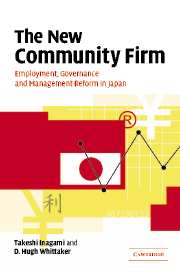Book contents
- Frontmatter
- Contents
- List of figures
- List of tables
- Preface
- Acknowledgements
- Part 1 The End of the Community Firm?
- Part 2 Hitachi: ‘Here, the Future’
- 8 Hitachi: A Dancing Giant
- 9 A Victim of its Own Success?
- 10 Organization Reform
- 11 Recasting the Employment Relationship
- 12 The Impact on Industrial Relations
- 13 Evaluation
- Part 3 The Reformed Model
- Appendix: Changes in Job Tenure
- References
- Index
13 - Evaluation
Published online by Cambridge University Press: 22 September 2009
- Frontmatter
- Contents
- List of figures
- List of tables
- Preface
- Acknowledgements
- Part 1 The End of the Community Firm?
- Part 2 Hitachi: ‘Here, the Future’
- 8 Hitachi: A Dancing Giant
- 9 A Victim of its Own Success?
- 10 Organization Reform
- 11 Recasting the Employment Relationship
- 12 The Impact on Industrial Relations
- 13 Evaluation
- Part 3 The Reformed Model
- Appendix: Changes in Job Tenure
- References
- Index
Summary
Hitachi's reforms can be evaluated in a number of ways, including the following. First, in terms of their own objectives, have they brought about the kinds of changes envisaged when they were launched? Second, how do they compare with the reforms of other companies which have similarly attempted to bring about corporate renewal? And third, what do the outcomes mean for the classic model of the community company?
This chapter evaluates the reforms on these three counts. We start with a brief summary of the reforms and an interpretation of deeper cultural changes. We then look at the extent to which the reforms have diffused and taken root, based on interviews of managers at various levels, group interviews in diverse workplaces, and survey findings. In addition to the qualitative aspects of reform, we consider briefly the quantitative, bottom line results.
Next we take a comparative view. Although various companies might be selected for comparison, both within Japan and abroad, we have chosen GE, the premier US general electric company whose transformation under Jack Welch was widely admired, and in many ways symbolized the transformation of corporate America in the 1980s and 1990s. As we shall see, there are both similarities as well as contrasts between the two. The contrasts reveal important aspects of continuity in the community firm.
Finally, we assess the reforms in terms of implications for Hitachi's community firm, through changes in employment practices, corporate governance and managers' priorities, as well as membership, boundaries and internal cohesion.
- Type
- Chapter
- Information
- The New Community FirmEmployment, Governance and Management Reform in Japan, pp. 216 - 234Publisher: Cambridge University PressPrint publication year: 2005



